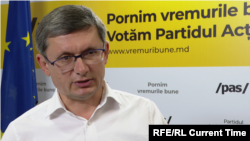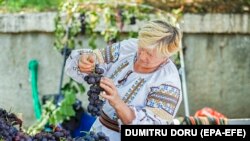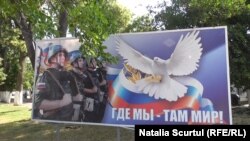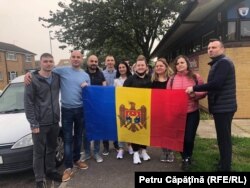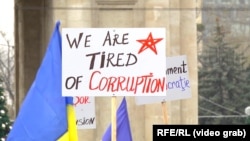Moldova’s July 11 parliamentary elections led to the victory of a pro-European Union party touted as all about reform and fighting corruption. The vote was interpreted as a thumbs-up to the West over Russia, but what precise reforms does the Action and Solidarity Party (PAS) have in mind?
In an interview with Current Time news anchor Iryna Romaliisko, PAS leader Igor Grosu, 48, who is expected to become prime minister, elaborated.
Grosu's party, of which President Maia Sandu is also a member, won almost 53 percent of the nearly 1.47 million votes cast, just over 48 percent of eligible voters.
“People believed in their strengths,” he said of Moldovan voters.
Grosu, though, added that he will wait for the final election results before taking part in traditional Moldovan dancing to celebrate his party’s apparent win.
Under a Socialist-Communist coalition (BECS), parliament rejected Grosu’s nomination for prime minister in March, the second such failed presidential nomination, which thereby prompted early elections. The BECS coalition won roughly 27.2 percent of the July 11 vote.
If this time confirmed as prime minister, Grosu has pledged to start work “very quickly.”
Moldova, wedged between Romania and Ukraine, faces long-standing challenges of corruption, labor migration, economic anemia, and the presence of some 1,500 Russian troops in its separatist region of Transdniester.
“Yes, all responsibility [for reforms] is on us, and we won’t run away from this responsibility,” Grosu pledged.
Relations With Russia:
-How will you build relations with the Russian Federation? The Socialists were afraid that this is a complete rift. And, generally, from the sidelines, this [vote] looks like a choice between the West and Russia.
--I’m more than certain that each time [we have elections], the Russian Federation, based on those signals that reach us, has assessed our victory as an honest victory. This indicates that they understand that we are predictable partners, we want to build good relations. We have very many fellow citizens who live in Russia, and this connection is very important. We will work to defend their rights.
They have their own businesses there. Even those who are from my village, my compatriots, work in Sochi, it seems, and feel very good. We have relatives there, and so on.
The economic ties are very important because this is a traditional market for Moldova. Moldova, as a former country of the Soviet Union, exported its products. Here, of course, we have our shortcomings in these products' quality or neatness, shall we say.
The Russian side rightly says that there is the phenomenon of re-export. And this speaks of our problems, of corruption in the ANSA (National Agency for Food Safety), the agency that provides supporting documents [for exported food] products.
And that's where they're right. We have to work on this.
Transdniester is a conflict that needs to be resolved, and there are two components to it.
There's the external factor, which Moldova should watch very attentively because Russia also will play a very important role in its resolution, as well as the European Union, and our neighbors. And without Russia’s help, we won’t be able to move forward in this direction.
And there’s the internal work. It's already our job to defend our people’s rights, fight corruption so that citizens from the left bank (of the Dniester River; the Transdniester region) feel the difference.
-If you choose a course toward Europe, then Russia will immediately start to exert pressure. That’s going on, at least, with all of the post-Soviet countries. In gas, for example.
-We very consistently follow European integration. Moldova is a neutral state, and we say that we feel and consider ourselves to be part of European civilization.
Therefore, to see some problems in this … I think that we have a good opportunity both to debate and discuss the possibilities of Russian investment, and we know that there is such a desire in the agro-industrial sector, for example, and so on.
We will be predictable. We will be correct, and we expect such relations from our partners.
-And the Russian troops and [military supply] depots will be withdrawn from the territory of the Republic of Moldova before the end of your term? I mean, from Transdniester?
-I think that this process should be discussed together. I think that this will be an opportunity for both Moldova and Russia because this frozen conflict, fortunately, is not like other frozen conflicts. It is somehow artificially supported by mafia structures from both sides of the Dniester. And I think that we’ll have a good opportunity with our Russian colleagues to discuss [the issues] to make a good “best case” out of this from which everyone will benefit.
Integration With The European Union:
-Before the end of your mandate, do you intended to enter the European Union?
You know, let’s put it this way: We should first do our homework, our assignment. Because entering [the EU] for European integration is not the aim in itself. There’s a lot of homework behind this whole slogan because no one will come from the European Union, from [neighboring EU member] Romania, or from somewhere in Brussels, and do this work for us.
We, first of all, should show that government institutes exist and work in our country, that a fight against corruption is being fought, that freedom of speech, of movement, and so on, all rights are observed. And then this process will be organic, and not just formally someone voted [for it] and they accepted Moldova.
Of course, we will aim for this, but now we’re only at the beginning of this path of real reforms on fighting corruption, on improving our standard of living.
Fighting Corruption, Responding To Labor Migration:
-We spent a week in Moldova, and the main issues that came up worry literally everyone. These are low salaries and high labor migration. Do you have a concrete plan of action? What will you do about this?
-Of course. We’ll start with the pension because we have somewhere around 400,000 pensioners who have a pension less than 2,000 leus (just over $111). That’s a bit less than 100 euros. We have public obligations to raise [the pensions] from October 1 to a minimum of 2,000 leus.
-Where do you get this money?
-There’re domestic resources, foreign resources. We know where they are.
-What are the foreign ones?
-This is financial budgetary assistance from the European Union, from the World Bank, from our partners.
-Loans or allocations?
-Allocations. But, in general, the domestic resources are those resources that haven’t been a priority for former governments to use. We’ll redirect them to this category.
-And what will you take them from?
- For instance, capital investments. Right now, somewhere around half of these investments, of this money won’t be used this year for various reasons: bureaucratic, corruption, because the wrong person won tenders and they’re canceled, and will be repeated again, and this takes time, and so on.
The majority of this money, somewhere around 4.6 billion leus ($255.43 million), is the cost of this promise.
For salaries, probably, it will take more time because we’ll need to clear this burden from our businesses, from the tax services, customs, and so on, to attract investment; particularly after the pandemic year, the lockdown.
A large part of these 600 million euros [from the European Union for Moldova’s recovery from the COVID-19 pandemic] will go for economic revival, to help rehabilitate business because the hotel-restaurant sector suffered, as well as enterprises and the agro-industrial sector.
Last year, there was a drought. The government, unfortunately, didn’t have, to a large degree, more of a desire to find the means to help the agricultural sector.
All of these funds will be channeled toward rehabilitating business and, at the same time, increasing salaries.
-And migration?
Migration is a phenomenon that you can’t drastically change. And we all understand this.
Now we're expecting an influx of migrants, of people who, having work experience abroad, want either to come and invest their money here or to prove themselves in state structures in various roles.
And I just made an announcement: We’re open, just like last time [after the parliamentary elections], to those citizens of the Republic of Moldova who have already proved themselves abroad, to come here and try out various roles -- in parliament or the government, in various agencies.
And a large number of participants are from the diaspora, more than 208,000 of our fellow citizens. Their participation shows that they’re connecting their own prospects [with Moldova] because they’re of various ages. If we talk about older people, these are our mothers, fathers, who worked many years there [abroad], earned a pension in that country, and want to come back in their old age.
The one thing that they request is access to normal services, whether medicine, infrastructure, social services, and so on.
For them, we have to do this. For young people, this is a guarantee that they’re not losing money that they’ll invest. They’re not losing it because of business risks, but because of the risks of bureaucracy, which, unfortunately, exerts pressure and is continuing to exert pressure [on businesses].
-And corruption.
Yes, and corruption. Because bureaucracy and corruption work hand in hand. We need to cut the number of inspections. We’ll change the tax code.
The first inspection should not be an audit that ends in a fine, but it should be an inspection that ends with recommendations about what needs to change or correct in accounting, record keeping, and so on. That is, we need to change these institutions’ work philosophy, and we’ll do this.




